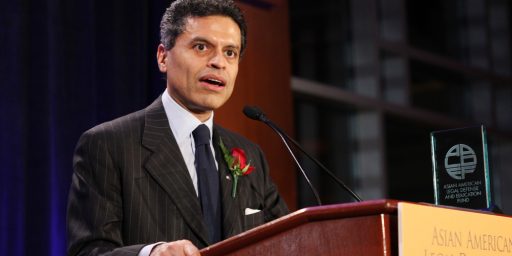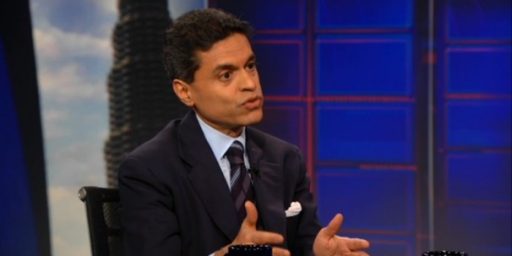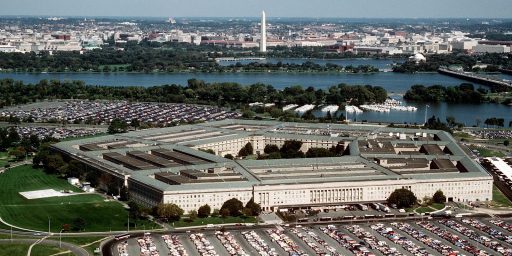LIBERTY AND DEMOCRACY
John Judis has an excellent review of a new book by Fareed Zakaria which argues that the US should be more concerned with instilling liberty in the developing world rather than focusing on electoral democracy:
He defines the former as the protection of individual rights of speech, property, and religion through a system of law not subject to arbitrary government manipulation. This phenomenon developed gradually over time, he argues. Imperial Rome had a system of law, but not constitutional liberty. England gained rudimentary constitutional liberties after the Magna Carta in 1215, and the United States was founded as a system of constitutional liberty in 1788.
Zakaria defines democracy, in contrast, as a political system based on “open, free, and fair elections.” In 1830, the United Kingdom had constitutional liberty but was not a democracy: only two percent of the population was eligible to vote. The United States became a full-fledged liberal democracy after women won the vote in 1920 and blacks were guaranteed access to the polls in 1965, and now most of Europe consists of liberal democracies also. Singapore today has liberty, but not democracy. Russia, on the other hand, has elections, but under Vladimir Putin it is tossing out some of the constitutional liberties it acquired after the fall of communism.
Zakaria argues that the best way to turn developing countries into liberal democracies is by fostering constitutional liberty rather than democracy. If electoral democracy is established in a society before it has achieved constitutional liberty, it is likely to either end up as an “illiberal democracy” (like Russia) or degenerate into fascism or populist authoritarianism (as Germany and Italy did between the world wars). He speculates that if elections were held now in many Middle Eastern or North African countries, they would be won by fundamentalist parties that would proceed to destroy whatever modicum of liberty exists and probably eliminate future elections as well.
This distinction is well worth noting. The United States had a strong sense of inalienable rights long before we were truly democratic, as did England. Free societies virtually always develop into democracies; the reverse is far less certain.
Update (1818): Thomas Friedman says essentially the same thing.





Hi,
There seems to me to be a problem with this distinction and its application in practice.
The only guarantor of the constitution in practice is a legislature like the Parliament of Great Britain in the period before universal suffrage. It is hard for one to see how constitutional liberty can be guaranteed in a nation without a degree of representative government and a legislature. Both the United States and Great Britain had a form of representative government, and a legislature, which ensured that there would be significant difficulty in abrogating constitutional liberties. Singapore is not precisely a good example either, because the enforcement of liberties is ultimately dependent on the whims of the executive (for example, leading opposition figures in Singapore have been forced out simply because they became a thorn in the executive’s side.). I find it hard to understand how these liberties can be safeguarded in the absence of a balance of power between an executive and legislative arm of a state. If a legislative arm does not exist, there is no reason for the executive to safeguard inconvenient constitutional liberties. So this distinction seems artificial.
The constitution and “liberty” by themselves mean nothing outside the ability of a society to respect and protect them. I find it hard to believe, for example, that blacks in the United States did have liberty in the sense that their constitutional rights were guaranteed them, prior to the civil rights movement of the 1960’s. It is precisely their right to vote and participate as full citizens of a democracy that guaranteed that these rights would be protected. There is no reason to believe that there was an incentive to respect their individual rights in practise without their ability to influence the political process.
Frankly, “constitutional liberty” in the absence of a democratic process makes no sense. There have been many former colonies who have had constitutions which guaranteed liberties of every sort, but which failed to enforce any of these liberties. And any rudimentary democratic process that existed was itself gradually poisoned and finally, the very liberties that were supposed to be guaranteed independent of the executive were taken away. In practice, liberties will not be observed in the absence of a system of checks and balances, and it is the natural tendency of any executive authority to accrue more power unto itself. Typically, a judicial authority is insufficient to counterbalance the power of the executive by itself because it has no political support and appointments to the judiciary are ultimately influenced by the executive arm of govt. This is why the triad of an executive, legislature and a judiciary is neccesary.
Krishna,
You make an excellent point about the practicalities. I think the point isn’t so much that we shouldn’t put in the institutions of democracy, just that doing so is insufficient. To use your own example, American blacks ostensibly had the right to vote in February of 1870. They didn’t have full civil rights until 95 years later.
Also, I’d argue the UK has unity of powers, so any distinction between legislature and executive is meaningless. The Prime Minister and Cabinet perform quasi-executive powers, but they do so because they lead the majority party in the House of Commons. The Queen is a true executive, but only on paper.
Recall also that Parliament was largely powerless until well into the 1800s. Monarchs routinely ignored Parliamentary edicts and indeed abolished Parliaments. This began to change only as the political culture of the UK changed, with a gradual increase in the sense of the rights of the nobility and, much later, the common man vis-a-vis the Crown.
—